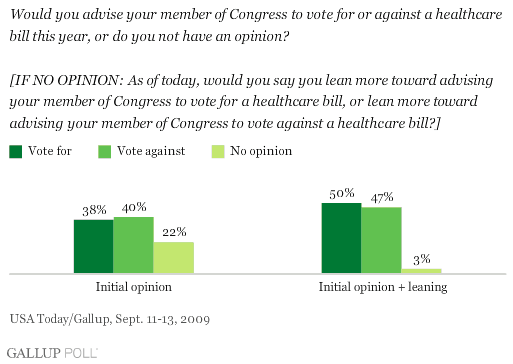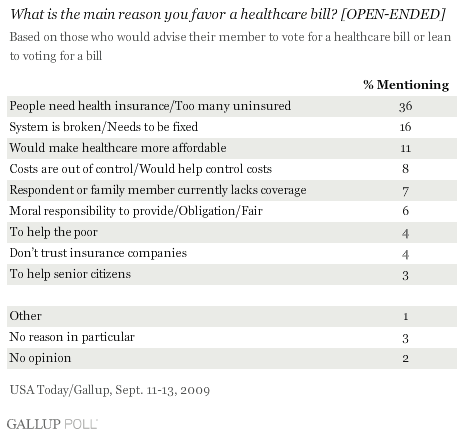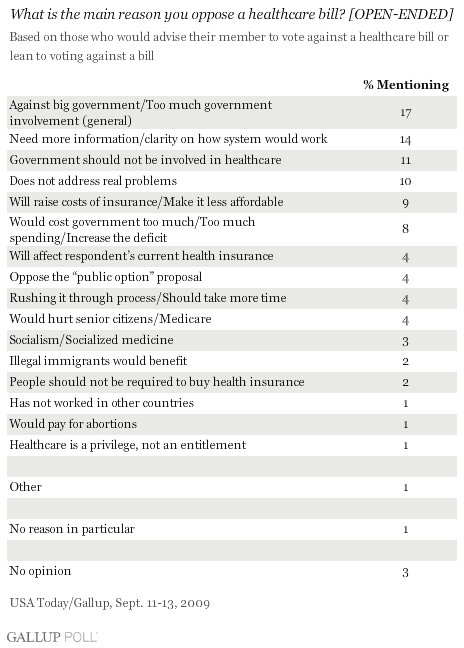PRINCETON, NJ -- Americans are closely divided as to whether Congress should pass a healthcare bill this year. Thirty-eight percent say they would advise their member to vote for a bill, 40% would advise a "no" vote, and 22% do not have an opinion. When the leanings of those without an opinion are taken into account, 50% of Americans favor or lean toward favoring a bill, while 47% oppose it or lean toward opposition.

These results are consistent with other Gallup research over the past month that finds Americans closely divided in their support for or opposition to a healthcare reform bill.
The new Sept. 11-13 USA Today/Gallup poll probed Americans' views on new healthcare legislation by asking why they favor or oppose such a bill.
Support for healthcare legislation seems primarily motivated by a desire to insure those who currently lack health insurance -- 36% say people need it and too many Americans lack it, 6% believe the country has a moral obligation to provide it, and 7% cite their own (or a family member's) lack of insurance. Cost is also a significant factor in support among healthcare bill proponents -- as 11% believe legislation would make healthcare more affordable and 8% see it as a remedy for out-of-control costs. One in six supporters simply say the system is broken and needs fixing.

"Americans -- who were divided on healthcare reform legislation before President Obama addressed Congress last week -- remain so after the speech."
Americans who oppose healthcare legislation mainly do so because of concerns about big government, generally, (17%) or government involvement in the healthcare system, specifically (11%). There are also concerns about how healthcare legislation will affect healthcare costs (9%) and about its cost to the government (8%), particularly in terms of its impact on the federal budget deficit. Many also express doubts that the proposals will work, either because they don't address the "real problems" in the system or because respondents believe that government-sponsored healthcare has not worked in other countries.
Notably, a rather substantial 14% cite a lack of specific information or details about the proposals as the reason for their opposition. It's possible that some of these Americans could switch sides and favor reform if the details were to their liking.

Bottom Line
Americans -- who were divided on healthcare reform legislation before President Obama addressed Congress last week -- remain so after the speech. Part of this stems from deep partisan divisions, with the vast majority of Republicans opposed to reform and the vast majority of Democrats in favor.
The reasons Americans support or oppose new healthcare legislation are a mix of philosophical and practical concerns. Opponents of reform have philosophical concerns about the growing size and reach of the federal government, as well as practical concerns as to whether the plans being advanced would work to address the problems they see in the healthcare system. Supporters view too many Americans as lacking insurance in a practical sense, which aligns with a more philosophical belief that everyone should have health insurance.
It is unclear how much success the president and other healthcare reform proponents will have in changing Americans' philosophical views about healthcare, which are probably more fundamental to their worldviews and therefore resistant to change. However, the final details of the plan Congress may vote on -- perhaps most importantly, how the government proposes to pay for it -- could help to ease some of Americans' practical concerns, which could in turn increase support for healthcare reform.
Survey Methods
Results are based on telephone interviews with 1,030 national adults, aged 18 and older, conducted Sept. 11-13, 2009. For results based on the total sample of national adults, one can say with 95% confidence that the maximum margin of sampling error is ±4 percentage points.
For results based on the 498 national adults who favor a healthcare bill, the maximum margin of sampling error is ±5 percentage points.
For results based on the 499 national adults who oppose a healthcare bill, the maximum margin of sampling error is ±5 percentage points.
Interviews are conducted with respondents on land-line telephones (for respondents with a land-line telephone) and cellular phones (for respondents who are cell-phone only).
In addition to sampling error, question wording and practical difficulties in conducting surveys can introduce error or bias into the findings of public opinion polls.
